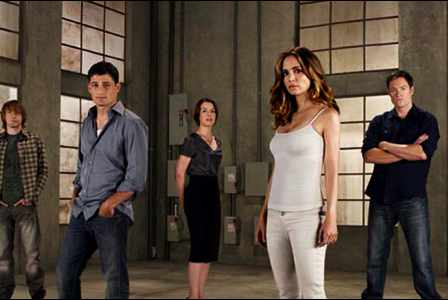Dollhouse: “Vows” (Episode 2.1)

The season-two premiere of Dollhouse kept the momentum from its strong finish last season—and threw quite a few bones to Joss Whedon and Battlestar Galactica fans. You had Jamie Bamber (using his native British accent) reuniting with fellow BSG alumn Tahmoh Penikett in a guest appearance. Alexis Denisof (using his native American accent) joined Buffy/Angel costars Eliza Dushku and Amy Acker in a recurring role. (Firefly‘s Summer Glau and BSG’s Michael Hogan join the fun later in the season.) And, of course, Joss, the man himself, wrote and directed the episode, which means you get the heaviest possible dose of all the Whedon hallmarks. Lots of meta, moral ambiguity, philosophical questions, great dialogue, memorable quotes, funny asides, awkward interpersonal tension, significant character development and some sort of twist to propel the story forward. Oh… plus, Fozzie Bear.
Last season, the series got off to a slow start.I almost gave up, despite being a massive Whedonite—I pretty much think he’s our generation’s William Shakespeare, at least our Kafka or Dostoevsky. It just didn’t feel like his heart was in it. You could sense potential, but it repeatedly disappointed.
Dollhouse steadily improved over the second half of the season. And the DVDs were a revelation. The unaired 13th episode, “Epitaph One” with Felicia Day and set 10 years in the future, was sci-fi magic. And the unaired pilot showed what could have been. Even without the behind-the-scenes featurettes and commentary that explicitly callout Fox’s interference, it’s obvious just from watching those episodes and the show’s evolution that ham-fisted executives screwed the pooch. They wanted sexed-up action-adventure confined to single-episode stories, killing what was most intriguing about this and all of Whedon’s shows: the through-line, the meta. Whedon says he was six episodes in by the time he got one that he was happy with.
Nonetheless, he and his writers share responsibility for weak single-episode stories. There is little inspired or unique about the individual storylines. Even in its improved state, Dollhouse is best when it simply abandons those. (While the multi-episode and multi-season arcs have always been an important part of what made Whedon’s shows special, his other shows also had great standalone episodes.)
-

-

-

-

-

-

-

-

-

-

-

-

-

-

-

-

-

-

-

-

-

-

-

-

-

-

-

-

-

-

-

-

-

-

-

-

-

-

-

-








































